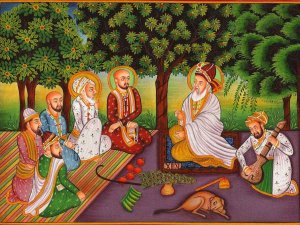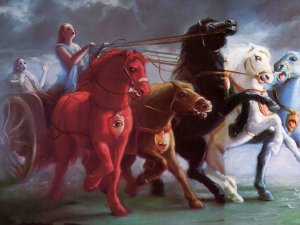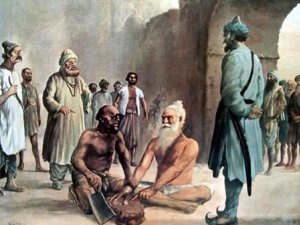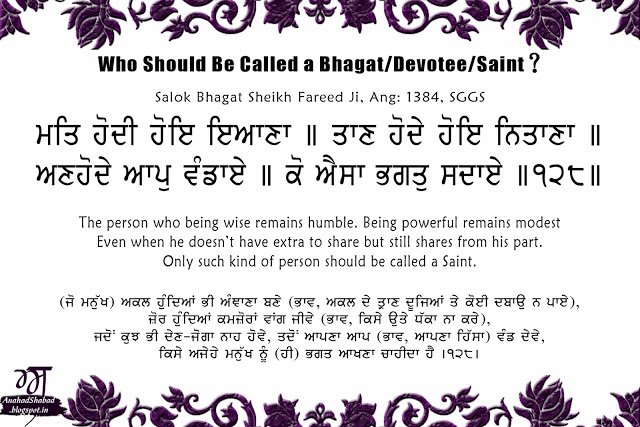
Sheikh Farid whose full name was Fariduddin Masaud was born in 1173 A.D. at the Village Khotiwal near Multan (Pakistan). His grandfather migrated from Ghazni to India due to political upheavals. On account of his great piety, Sheikh Farid rose to be head of the Chishti branch of Sufis. He settled at Ajodhan (Pak Pattan) in the Montgomery district of Pakistan. There is no doubt that two hymns of Sheikh Farid in Rag Aasa (SGGS: 488), two in Rag Suhi (SGGS:794)and 112 Sloks (prologues) included in Sri Guru Granth Sahib at pages (1377-84) are from the lip and pen of Sheikh Farid ( 1173-1266A.D).

According to Dr. R.L.Ahuja, a research scholar, (The Punjab Past and Present Vol.V11 Page 371) Guru Nanak visited Pak Pattan when he was 64 years old to hold spiritual colloquy with Sheikh Ibrahim who was the 12th successor of Sheikh Farid and collected the compositions of Sheikh Farid from him. Guru Nanak included them in the treasure of teachings which he left for the guidance of his followers.
Similarity in the Compositions of Sheikh Farid and Gurbani
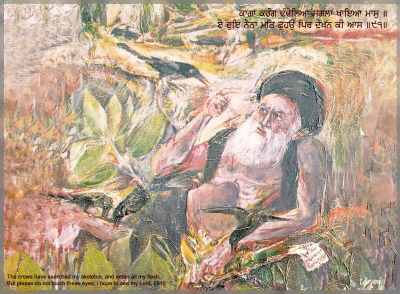 Guru Nanak found these compositions of the great Sufi saint, Sheikh Farid, who flourished 3 centuries earlier, of great moral teaching and spiritual experience, and liked them. Guru Arjan Dev made them a part of the sacred scripture, Sri Guru Granth Sahib. Guru Nanak and other Sikh Gurus reflected on Farid's compositions, they found some difference with him in matter of emphasis or opinion on certain points and composed their own views in the form of Sloks, while compiling Sri Guru Granth Sahib, Guru Arjan Dev added some of them in the body of the Sloks of Sheikh Farid next to the concerned Slok.18 Sloks of the Sikh Gurus have been added to the Sloks of Sheikh Farid and this appears to be an interesting and lovely dialogue of perfect understanding within SGGS. So there are 130 Sloks under the heading Sloks Sheikh Farid.. Out of these 18 Sloks, 4 sloks are by Guru Nanak Dev, 5 by Guru Amar Das, one from Guru Amar Das and 8 by Guru Arjan Dev. Let us find this similarity in these compositions.
Guru Nanak found these compositions of the great Sufi saint, Sheikh Farid, who flourished 3 centuries earlier, of great moral teaching and spiritual experience, and liked them. Guru Arjan Dev made them a part of the sacred scripture, Sri Guru Granth Sahib. Guru Nanak and other Sikh Gurus reflected on Farid's compositions, they found some difference with him in matter of emphasis or opinion on certain points and composed their own views in the form of Sloks, while compiling Sri Guru Granth Sahib, Guru Arjan Dev added some of them in the body of the Sloks of Sheikh Farid next to the concerned Slok.18 Sloks of the Sikh Gurus have been added to the Sloks of Sheikh Farid and this appears to be an interesting and lovely dialogue of perfect understanding within SGGS. So there are 130 Sloks under the heading Sloks Sheikh Farid.. Out of these 18 Sloks, 4 sloks are by Guru Nanak Dev, 5 by Guru Amar Das, one from Guru Amar Das and 8 by Guru Arjan Dev. Let us find this similarity in these compositions.
I will give only a few examples to shorten the article. Number of the Slok is given in ( ).
Love of God and Meditation
Sheikh Farid has stressed on the meditation and love of One God, and wants that we should always remember and obey Him. He is of the view that one has no right to live if one does not pray. Gurbani also lays emphasis on prayer.
Sheikh Farid warns us not to waste time and meditate lest we should miss the opportunity. Guru Angad Dev also emphasized this point . Both have used similar words at some places:
auTu PrIdw aujU swij subh invwj gujwir ]
jo isru sWeI nw invY so isru kip auqwir ] (71)
'Rise up, Farid, perform your ablutions and engage in morning prayer.
The head not bowing before the Lord merits not to remain on the shoulders.'
jo isru sWeI nw invY so isru dIjY fwir ]
nwnk ijsu ipMjr mih ibrhw nhI so ipMjru lY jwir ] ( SGGS:89)
'Chop off that head which does not bow to the Lord.
O Nanak, burn that human body in which there is no pain of separation from the Lord.'
God is within us
Sheikh Farid believes that God is within us and there is no need to renounce the world and live in forests. Gubani also advises us that there is no need of undergoing austerities in search of God Who is within us:
PrIdw jMglu jMglu ikAw Bvih vix kMfw moVyih ]
vsI rbu ihAwlIAY jMglu ikAw FUFyih ] (19)
'Farid, why do you wander from jungle to jungle, crashing through the thorny trees?
The Lord abides in the heart; why are you looking for Him in the jungle?'
kwie ptolw pwVqI kMblVI pihryie ]
nwnk Gr hI bYiTAw shu imlY jy nIAiq rwis kryie ] (Guru Amar das.104)
'Why do you tear apart your fine clothes, and take to wearing a rough blanket?
O Nanak, even sitting in your own home, you can meet the Lord if your mind is on the right path.'
Separation from God
Both Guru Nanak Dev and Sheikh Farid have realized the spiritual condition of one separated from one's Master and have described in the following quotations:
kwlI koiel qU ikq gun kwlI ]
Apny pRIqm ky hau ibrhY jwlI ] ( Sheikh Farid. SGGS:794)
'O black Koel, why are you so black?
(Reply)"I have been burnt by separation from my Beloved."
pbr qUM hrIAwvlw kvlw kMcn vMin ] (SGGS:1412)
kY doKVY siVEih kwlI hoeIAw dyhurI nwnk mY qin BMgu ]
'O tank (mine of lotus), everything was green around you, and your blossoms were gold.
What pain has burnt you, and made your body black? (Reply) 'O Nanak, my body is separated (from water, my source).'
Resignation to God's Will
Sheikh Farid has emphasized resignation to God's Will in the next reference. Guru Arjan Dev also has spoken highly of those who resign to God's Will'
Alh BwvY so Blw qW lBI drbwru ] (109)
'Fareed, treat pleasure and pain alike; eradicate evil from your mind.
You will reach His court when you consider that whatever the Lord wills is good for you.'
rUpvMqu so cquru isAwxw ]
ijin jin mwinAw pRB kw Bwxw ]' (SGGS:198)
'They who surrender to the Will of God are handsome,
clever and wise.'
Soul is Wife of the Almighty.'
Sheikh Farid and Gurmat both have treated the soul as wife of the Almighty :
jy jwxw shu nµFVw qW QoVw mwxu krI ](4)
'If I had known that my Husband Lord was so young and innocent, I would not have been so arrogant.'
ijin Dn ipr kw swdu n jwinAw sw iblK bdn kumlwnI ](Guru Nanak.SGGS:1255)
'The soul-bride who has not known delight with her Husband Lord, shall weep and wail with a wretched face'
Power of Death
Sheikh Farid has emphasized the power of death and short life of pleasures in many Sloks. Gurbani also stresses this point and teaches us to keep in mind the mighty death:
PrIdw iKMQiV myKw AglIAw ijMdu n kweI myK ]
vwrI Awpo AwpxI cly mswiek syK ] (47)
'Fareed, there are many stitches on the patched coat,
but there are none on your own frame.
However revered and great,
all must depart when their turn comes'
mrix n mUrqu puiCAw puCI iQiq n vwru ] ( Guu Nanak Dev.SGGS:1244)
'Death does not ask the, time; it does not ask the date or the day of the week.'
Stress on Good Deeds
Like the Sikh Gurus, Sheikh Farid warns us against indulging in sins lest we should regret afterwards in the Lord's court. In one of his Sloks, he paints a dreadful picture of the punishment for those who engage in evil deeds:
PrIdw ijn@I kMmI nwih gux qy kMmVy ivswir ]
mqu srimMdw QIvhI sWeI dY drbwir ] (59)
'Farid, forget about those deeds which do not bring merit.
Otherwise, you shall be put to shame in the court of the Lord,'.
ijqu kIqw pweIAY Awpxw sw Gwl burI ikau GwlIAY ]
mMdw mUil n kIceI dy lµmI ndir inhwlIAY ] (Gru Nanak Dev.SGGS:474)
'Why do you do such evil deeds for which you shall have to suffer?
Do not do any evil at all; look ahead with far-sightedness.'
Greed is condemned
Gurmat and Sheikh Farid have condemned greed, advised us to remain contented and sincere:
PrIdw jw lbu qw nyhu ikAw lbu q kUVw nyhu ] (18)
'Farid, love of God and greed do not go together.
When there is greed, love is rendered impure..'
swkq suAwn khIAih bhu loBI bhu durmiq mYlu BrIjY ]( Guru RamDas. SGGS:1326)
'The cur like mammon-worshipper is said to be very greedy.
He is overflowing with the filth and pollution of evil-thoughts.'
Humility and Sweet Tongue
Sheikh Farid counsels to practice humility and to avoid insipid speech. Guru Nanak has also said sweetness and humility are the essence of goodness and virtue':
invxu su AKru Kvxu guxu ijhbw mxIAw mMqu ]
ey qRY BYxy vys kir qW vis AwvI kMqu ] (127)
'Humility is the word, forgiveness is the virtue,
and sweet speech is the magic Mantra.
Wear these three robes, O sister,
and you will captivate your Husband Lord.'
nwnk iPkY boilAY qnu mnu iPkw hoie ]
iPko iPkw sdIAY iPky iPkI soie ] ( Guru Nanak Dev. SGGS:474)
'O Nanak, by speaking insipid words, one's body and mind become insipid.
One is called the most foul-mouthed and one's reputation becomes indifferent.'
Hypocrisy
Sheikh Farid condemns mere donning of the garb of a saint without sincerely trying to earn the merit that should be the aim of a saint's life. Guru Arjan Dev has also told us that hypocrisy does not pay:
PrIdw kMin muslw sUPu gil idil kwqI guVu vwiq ]
bwhir idsY cwnxw idil AMiDAwrI rwiq ] (50)
'Farid, those who carry the prayer mat over their shoulders
and wear rough wool, but utter falsehood with glib tongue
and wear a dagger in their hearts, look bright outside,
but their heart is dark as night.'
bwhru Doie AMqru mnu mYlw duie Taur Apuny Koey ] (SGGS:381)
'He washes outwardly, but within his mind is filthy;
thus he loses his place in both the worlds.
Contentment and Forbearance
Patience and forbearance has been stressed by Sheikh Farid in the next quote. Guru Nanak Dev has also advised us in Japji Sahib to keep patience:
sbru eyhu suAwau jy qUM bMdw idVu krih ]
viD QIvih drIAwau tuit n QIvih vwhVw ] (117)
'Let patience be your purpose in life; implant this in your mind.
In this way, you will grow into a great river;
you will not break off into a tiny stream.'
muMdw sMqoKu srmu pqu JolI iDAwn kI krih ibBUiq ] (SGGS:6)
'Make contentment your ear-rings, modesty your begging bowl and wallet,
and meditation the ashes you apply to your body.'
Love of Nature
Both Sheikh Farid and the Sikh Gurus have used birds as source of inspiration and guide to humanity. They love natural objects:
PrIdw hau bilhwrI iqn@ pMKIAw jMgil ijMn@w vwsu ]
kkru cugin Qil vsin rb n Cofin pwsu ] (101)
'Fareed, I am a sacrifice to those birds who live in the jungle.
They peck at the roots and live on sandy mounds,
but they do not lose faith in God.'
hMsw vyiK qrMidAw bgW iB AwXw cwau ]
fuib muey bg bpuVy isru qil aupir pwau ] (Guru Amar Daas.SGGS:585)
'Seeing the swans swimming, the herons became envious.
But the poor herons were drowned and died, and
they lay with their heads down, and feet above.'
Differences in Thinking
Like early Sufis, Farid believed in mortification of the body by restoring to forests and undergoing ascetic discipline and austerities. He, sometimes, becomes pessimistic and some his writings reflect despair and Guru Sahiban have, in their context emphasised Chardi Kalaa (high spirits):The Sikh Gurus differed with Farid in this respect:
qnu qpY qnUr ijau bwlxu hf blµin@ ]
pYrI QkW isir julW jy mUM iprI imlµin@ ] (119)
'My body burns like an oven; my bones are burning like firewood.
If my feet become tired, I will walk on my head if I can meet my Beloved.'
qnu n qpwie qnUr ijau bwlxu hf n bwil ]
sir pYrI ikAw PyiVAw AMdir iprI inhwil ] (Guru Nanak. SGGS:1384)
'Do not heat up your body like an oven, and
do not burn your bones like firewood.
What harm have your feet and head done to you?
Behold your Beloved within yourself.'
This may be an experience from the early life of Farid. Later on, he condemned the life of an ascetic and saw God in everyone (Slok 19). Farid did not raise his voice against the social and political discrimination of his time while Guru Nanak severely condemned the cruel rulers of his time.
Conclusion
By analyzing Sheikh Farid's teachings preserved in SGGS, we find that he too emphasized the practice of truth which Guru Nanak preached. There are some other interesting aspects. For example on p 488 he uses Naam in the same context as in rest of Gurbani. He says Visriaa jin naam se bhue bhaar theeay. Also in the same Shabad Pavardgaar appar agam beant too, has words normally not used by the Muslims. This is the reason why Fareed Ji's writings were included in SGGS.
No doubt, religious and spiritual values preached by Sheikh Farid are not exactly the same as preached by Guru Nanak who exhorted the Hindus to follow true Hinduism and the Muslims to be true Muslims. Still, compositions in SGGS and Farid's hymns are compatible. We can safely say that Sheikh Farid's compositions are in consonance with Gurbani ethos and he was the father of the Punjabi poetry.


